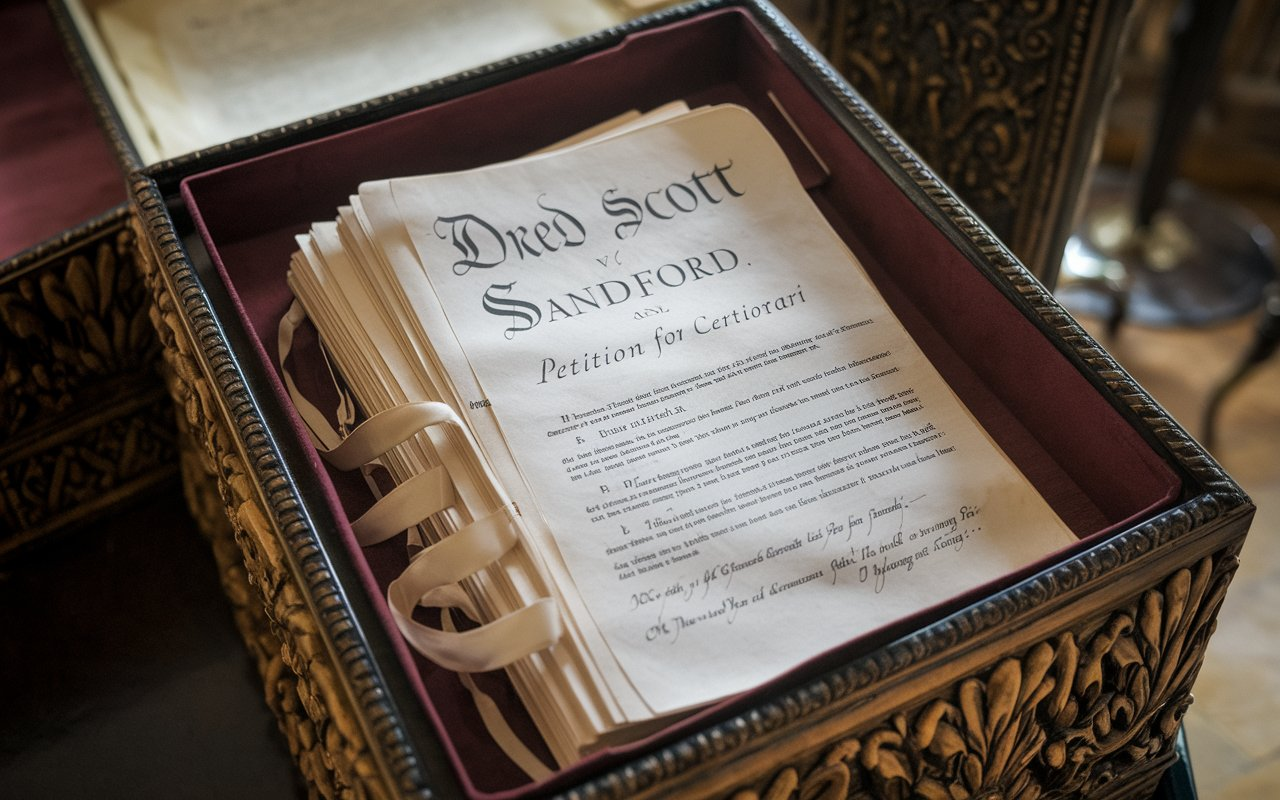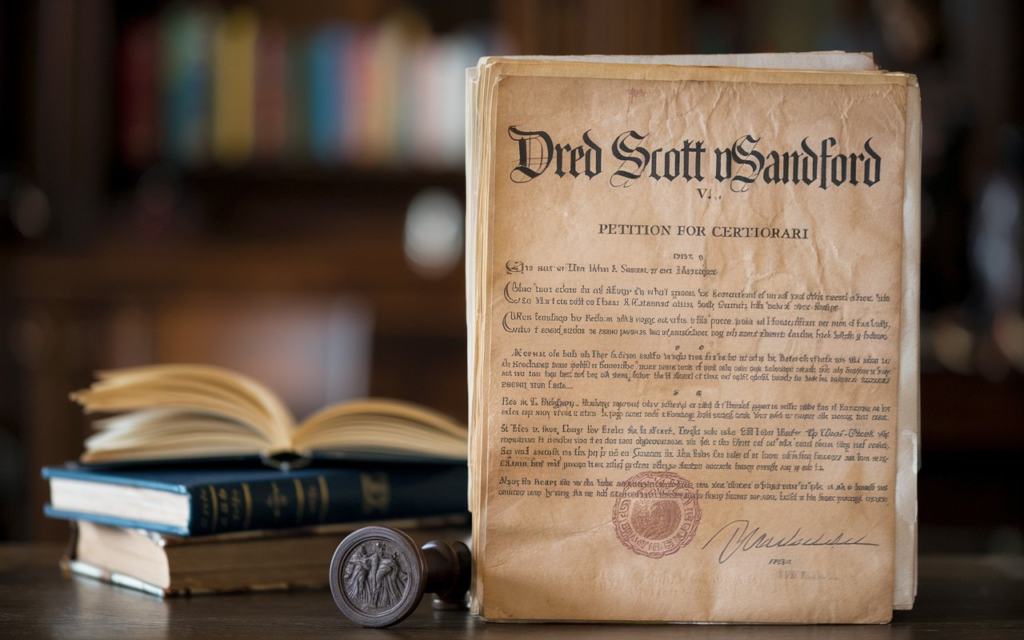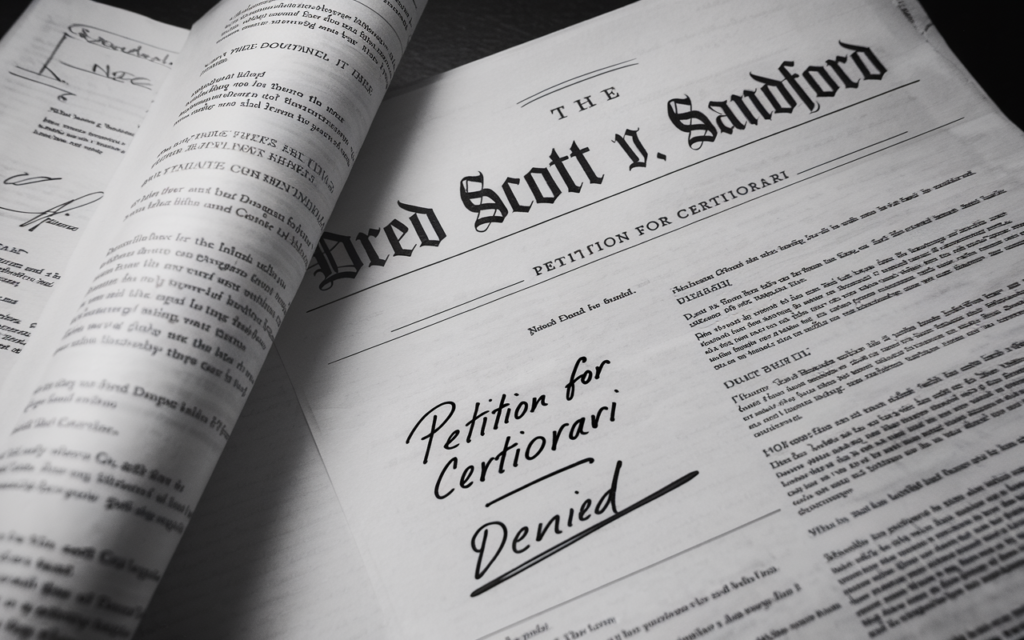Introduction
The Dred Scott v. Sandford Court Case Petition for Certiorari: refers to a pivotal legal battle in American history that challenged the fundamental rights of African Americans in the pre-Civil War era. Although the term “petition for certiorari” is modern, the essence of the case lies in Dred Scott’s pursuit of freedom through the legal system, reaching the U.S. Supreme Court in 1857. This case, which ultimately denied citizenship and legal protections to African Americans, declared the Missouri Compromise unconstitutional and fueled national debates over slavery. Its decision had a lasting impact, shaping the nation’s legal and social fabric.
The Origins of the Dred Scott Case
The Dred Scott v. Sandford Court Case Petition for Certiorari: stemmed from Dred Scott’s quest for freedom. Scott, an enslaved man, argued that living in free territories with his owner had made him legally free. His case began in Missouri courts and slowly advanced through the legal system. The growing tensions over slavery in the United States gave this case immense importance. It ultimately symbolized the nation’s fractured views on race and freedom.
Dred Scott’s Journey Through the Courts
The Dred Scott v. Sandford Court Case Petition for Certiorari: reflects Scott’s persistence in seeking justice. Initially, Scott sued in Missouri state court, where he briefly won his freedom. The Missouri Supreme Court, however, later reversed the ruling.The case eventually reached the federal level, as Scott sought recognition of his rights. This journey illustrated how deeply slavery was embedded in American law and society at the time.
The Role of the U.S. Supreme Court
The Dred Scott v. Sandford Court Case Petition for Certiorari: became a turning point when it was heard by the U.S. Supreme Court in 1857. Chief Justice Roger B. Taney led the court in issuing its infamous decision. The case questioned whether African Americans, free or enslaved, had legal standing in federal court and whether Congress had the authority to regulate slavery in U.S. territories. The Court’s ruling delivered devastating consequences for civil rights.
The Supreme Court’s Decision
In the Dred Scott v. Sandford Court Case Petition for Certiorari:, the Supreme Court ruled against Scott in a 7-2 decision. The court declared that African Americans were not citizens and, therefore, had no right to sue in federal court. Furthermore, the decision invalidated the Missouri Compromise, which had restricted slavery in certain territories. This ruling emboldened pro-slavery advocates and heightened national divisions.
Constitutional Implications of the Case
The Dred Scott v. Sandford court petition for certiorari raised profound constitutional questions. By declaring the Missouri Compromise unconstitutional, the Court asserted that Congress lacked the power to ban slavery in U.S. territories. This interpretation weakened the balance between free and enslaved person states. Additionally, the ruling cemented the idea that African Americans were property, not people, under U.S. law.
The Reaction to the Dred Scott Decision
The Dred Scott v. Sandford court petition for certiorari sparked outrage across the United States. Abolitionists condemned the decision as a moral and legal failure, while pro-slavery factions celebrated it as a victory. The ruling deepened divisions between the North and South, pushing the country closer to the Civil War. The case also galvanized anti-slavery movements, leading to more vigorous efforts to abolish slavery.
The Role of Roger B. Taney
Chief Justice Roger B. Taney’s role in the Dred Scott v. Sandford Court Case Petition for Certiorari: was pivotal. His majority opinion reinforced the notion that African Americans had no rights under the Constitution. Taney’s interpretation of property rights prioritized the interests of slaveholders over the humanity of enslaved people. His ruling left a controversial legacy, marking one of the lowest points in Supreme Court history.
Dred Scott’s Legacy
The Dred Scott v. Sandford Court Case Petition for Certiorari: left a lasting legacy in American history. Though Scott himself did not win his freedom through the courts, his case highlighted the injustices of slavery. The decision fueled abolitionist movements and set the stage for future legal battles over civil rights. Scott’s story remains a symbol of resilience in the face of systemic oppression.
The Case’s Role in the Civil War
The Dred Scott v. Sandford Court Case Petition for Certiorari: contributed directly to the eruption of the Civil War. By denying the federal government’s authority to regulate slavery, the ruling emboldened Southern states to defend the institution aggressively. This heightened tensions with Northern states, which opposed the expansion of slavery. The case underscored the nation’s inability to reconcile its foundational contradictions on freedom and equality.
Modern Perspectives on the Case
The Dred Scott v. Sandford Court Case Petition for Certiorari: is now widely regarded as one of U.S. history’s worst Supreme Court decisions. Modern legal scholars criticize the ruling for blatantly disregarding fundamental human rights and constitutional principles. The case serves as a reminder of the dangers of judicial bias and the importance of safeguarding equality under the law. It remains a significant chapter in the ongoing struggle for justice and civil rights.
Conclusion
The Dred Scott v. Sandford Court Case Petition for Certiorari: is a stark reminder of the injustices that shaped America’s history. The ruling, which denied African Americans citizenship and upheld slavery, marked one of the darkest moments in U.S. legal history. It highlighted the deeply entrenched racial inequalities of the time and exposed the limitations of the judicial system in protecting fundamental human rights. Although the decision failed to deliver justice for Dred Scott, it fueled the abolitionist movement and set the nation toward the Civil War and eventual emancipation. Today, the case is a powerful lesson about the enduring need for vigilance in the fight for equality and justice for all.


